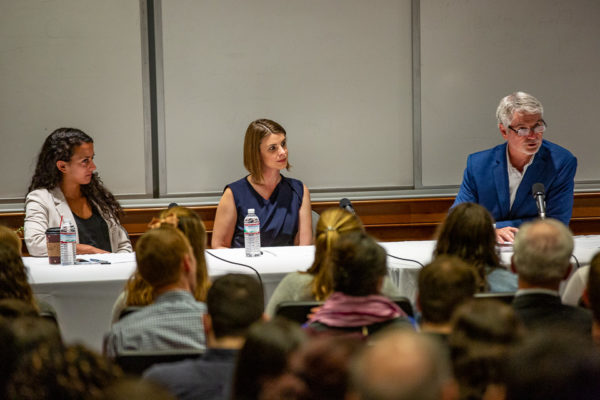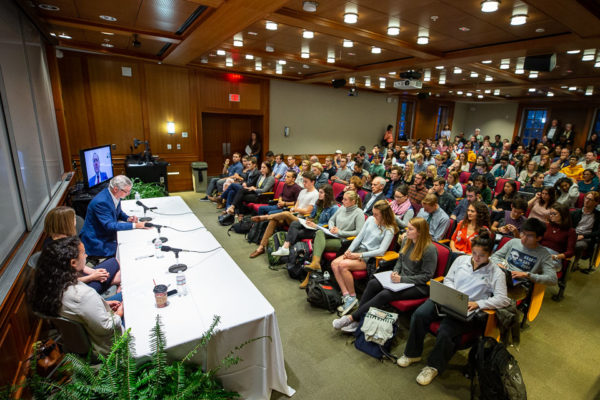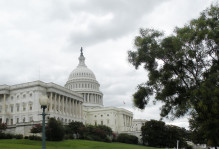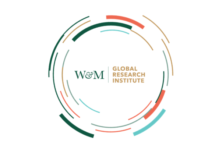Journalism in a Changing World: William & Mary Welcomed Foreign Policy Journalists to Discuss the Trump Era
By Jane Handa ’21
Students, faculty, and Williamsburg community members were eager to hear from experts at last week’s Foreign Policy Journalism in the Trump Era: A Panel Discussion. Sponsored by Teaching, Research & International Policy (TRIP) of William & Mary’s Global Research Institute, three journalists came prepared for a discussion. David Sanger of the New York Times, Susan Hennessey of the Brookings Institute and CNN, and Akela Lacy ‘15 of The Intercept joined Global Research Institute Co-Director Mike Tierney in conversation about the current state of foreign policy journalism.

The panel featured feature David Sanger (not pictured), Susan Hennessey, and Akela Lacy in a conversation on the state of journalism and the media in the Trump era. GRI Director Mike Tierney moderated. (Skip Rowland ’83)
After brief introductions of each panelist (with Sanger joining through video conference), Tierney asked them questions about how they view foreign policy journalism today. Asked about how foreign policy journalism has changed in the past 5 years, Sanger responded that “The pace has picked up, and a broader but less educated readership has begun to grow with the many different ways people communicate,” while Lacy added, “The way international relations shows up in the news has changed recently. There is more foreign policy coverage in domestic outlets, but it might not be in the way people want them to, since the way this administration communicates is very different.” Tierney then asked about how the Trump administration has changed journalism, asking about sources, relationships with foreign countries, the status of journalists, and impeachment. Hennessey remarked, “Even though there are no briefings, we still know a lot about what’s going on on a granular level. However, the quantity and types of leaked information is troubling and something we’ve never seen before. Compromising sources can cause damage, erode institutional cultures, and leads to the destruction of norms between institutions and the bureaucracy.” To this, Sanger commented, “Over the last 2-3 years of journalism, throughout the Russia investigation, almost everything that the New York Times has published has been classified, but this is because things are over-classified. This is not to say sources don’t need to be classified, but the intent is to judge everything individually and engage with the U.S. government and decide whether or not negative consequences will result from this.”

Panelists addressed a packed room where attendees were eager to learn and ask questions. (Skip Roland ’83)
On the impeachment inquiry, Lacy said, “Foreign policy issues have been the issues where even President Trump’s allies in Congress drew a line where they would resist him. The issue now is that Congress is not doing that. The argument that the president is using his office for personal gain is clear, but there’s been plenty of coverage about Trump doing the same thing with his business, so it is hard to tell if it is illegal.” Hennessey added, “The challenge for Congress and the press is to cover this in a comprehensive way that is understandable to the public while keeping hold of the core issue, which is does the president have the obligation to place the public interest over his personal interest. We have to anchor coverage in this issue.”
In the packed room, attendees were eager to learn and ask questions on this hot-button issue. “I found it very informative and interesting,” Diana Haemer ’20 said, “The panelists were from different places and focused on different aspects of politics, so it was cool to see how their job and publication medium affected their interpretation of contemporary foreign policy.” Camila Batres ’21 added, “I really liked learning about how media influences and plays into politics, and how politics influence the media. It opened my eyes to how the current president talks about the media differently from past presidents.” Students and community members alike stayed after the event to attend a reception and ask additional questions of the panelists.




No comments.
Comments are currently closed. Comments are closed on all posts older than one year, and for those in our archive.